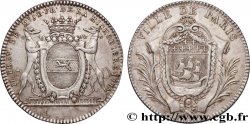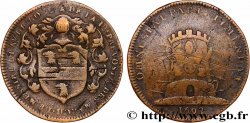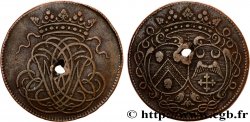E-auction 511-423506 - fjt_672459 - ILE DE FRANCE - TOWNS AND GENTRY Louis Bellavoine, receveur général des pauvres 1662
You must signin and be an approved bidder to bid, LOGIN TO BID. Accounts are subject to approval and the approval process takes place within 48 hours. Do not wait until the day a sale closes to register. Clicking on « bid » constitutes acceptance of the terms of use of cgb.fr private e-auctions.
Bids must be placed in whole Euro amounts only. The sale will start closing at the time stated on the item description; any bids received at the site after the closing time will not be executed. Transmission times may vary and bids could be rejected if you wait until the last second. For further information ckeck the E-auctions F.A.Q.
NO BUYER'S FEE.
NO BUYER'S FEE.
| Estimate : | 20 € |
| Price : | 9 € |
| Maximum bid : | 11 € |
| End of the sale : | 30 January 2023 19:16:00 |
| bidders : | 4 bidders |
Type : Louis Bellavoine, receveur général des pauvres
Date: 1662
Metal : copper
Diameter : 27,3 mm
Orientation dies : 6 h.
Weight : 6,23 g.
Edge : lisse
Obverse
Obverse legend : LOVIS. BELLAVOINE. RECEVEVR. GENERAL. DES. PAVVRES ; SOUS LE CARTOUCHE : 1662.
Obverse description : Monogramme sur un cartouche orné.
Reverse
Reverse legend : VRBIS. ET. FORI. PAVPERVM.TVTELA.
Reverse description : Écu aux armes de Paris entouré d'une couronne de laurier.
Reverse translation : La protection des pauvres de la ville et de la voie publique.
Commentary
En 1544, l'administration des pauvres de la ville de Paris fut confié à un Bureau des pauvres: l'administration publique relayait ainsi le clergé dans le rôle d'assistance aux plus démunis. Ce bureau était composé de six membres du Parlement, six avocats, un conseiller à la Chambre des comptes, deux chanoines, trois curés, quatre procureurs au Châtelet et seize notables. Parmi les bourgeois les plus riches était choisi un receveur des pauvres, élu pour deux années et chargé de lever les diverses taxes établies à cet usage.
In 1544, the administration of the poor in the city of Paris was entrusted to a Bureau of the Poor: the public administration thus replaced the clergy in the role of assisting the most destitute. This bureau was composed of six members of Parliament, six lawyers, a councilor at the Chamber of Accounts, two canons, three curates, four prosecutors at the Châtelet and sixteen notables. From among the richest bourgeois was chosen a receiver of the poor, elected for two years and responsible for levying the various taxes established for this purpose
In 1544, the administration of the poor in the city of Paris was entrusted to a Bureau of the Poor: the public administration thus replaced the clergy in the role of assisting the most destitute. This bureau was composed of six members of Parliament, six lawyers, a councilor at the Chamber of Accounts, two canons, three curates, four prosecutors at the Châtelet and sixteen notables. From among the richest bourgeois was chosen a receiver of the poor, elected for two years and responsible for levying the various taxes established for this purpose








 Report a mistake
Report a mistake Print the page
Print the page Share my selection
Share my selection Ask a question
Ask a question Consign / sell
Consign / sell
 Full data
Full data









